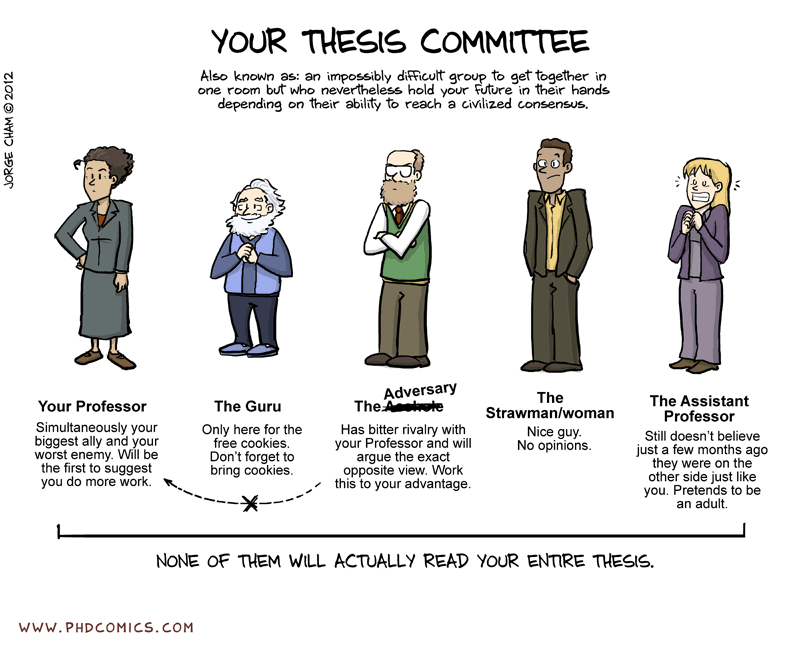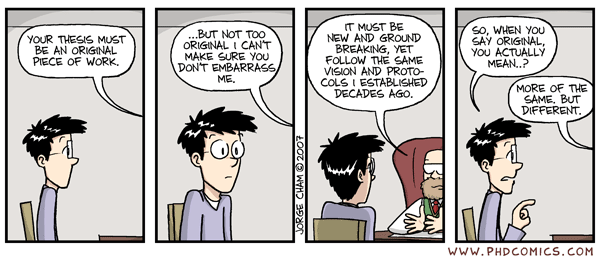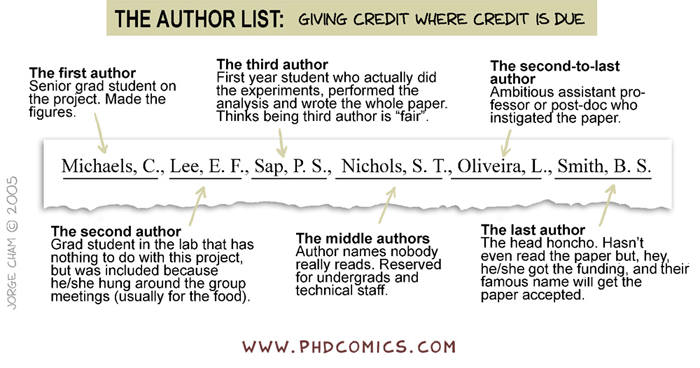During my PhD, I was unfortunate to have to work with an advisor who had no sympathy for scientific and intellectual work. Strange, as it may sound, he advised me in the wrong direction and intentionally prolonged my PhD and obstructed my work in AI. Here are some funny, malicious, and mostly unbearable things my advisor did.
He told us: “We can find data for any algorithm you design.”, urging us to fudge results. I did not follow this recommendation.
He advised us to not expose datasets in which our algorithms did not work, recommending data skimming to make our algorithms look better than they actually are, by not showing the limitations we know of. I did not follow this recommendation.
Apparently, he told one of my peers that “We cannot define a new problem. We can only propose an improvement over a parallel solution to a problem already solved.”. In other words, we cannot propose anything that matters, because we are, somehow, inferior by nature, I suppose. I did not follow this recommendation.
He also advised us: “We do not know information theory” in response to my honest (and as it later turned out extremely correct and useful) criticism of an obviously crippled compression scheme he wanted to have a friend of mine waste his time with. I did not follow this recommendation.
He advised us: “We do not know English.” meaning that we should write at a primary-school level of English. I did not follow this recommendation.
After I published my first philosophy paper as the sole author, he told me “You can publish a philosophy paper, but there would be consequences.”. He destroyed my first PhD proposal I presented to the PhD jury in 2004, and also destroyed all of my 7 progress reports, essentially forcing me to restart my thesis which I had already half-completed by 2004.
The world’s most legendary PhD advisor crowned his anti-scientific stance by his unforgettable words: “Being a scientist and an academician are two different things.”. I did not follow this recommendation, either. Our advisor was adept at gaming the system and collecting citations from his former clone students, but he was not a creative researcher, he preferred to regurgitate something barely significant he did 20 years ago instead. A contribution that I would rank 5 out of 10, merely some simple heuristics. By the way, my work in AI is mainly about replacing heuristic programmers with AI. He did appreciate this at some point, and protested “He will solve every problem!” (as if that is a bad thing), which I certainly will. Simpler heuristics the sort of which he worked on, will be one of the first things we will automate in computer science.

In my second PhD proposal, the amazing PhD jury told me that “Just because you have published this in an international conference, does not mean that you can put it into your PhD thesis” referring to my work in incremental general purpose machine learning. They also told me that “This is a stupid idea.” because I countered the no-free lunch theorem during my presentation. I was actually quite humble presenting my work, I even made a joke that something as simple as a stochastic grammar cannot possibly be solving this grand problem of AI, but it seemed that somehow presenting material that surpasses the intelligence level, or perhaps more accurately the confidence level, of the jury was simply not permissible. To me, it looked like they simply denied thinking, not that they could not understand if they tried hard enough. Fascinating homo sapiens nature. Ridiculous, as well.
My PhD advisor asked me to publish three more top journal papers after I published one that got something like 10 citations. This was done deliberately to prevent me from getting the degree. I did not follow this recommendation. One such major publication was enough by the rules of the university. I did receive my degree as I deserved, after I brought this matter to the attention of the university administrators. Our rector is an honest scientist, and he is famously very stringent on academic integrity, and I think he may have sympathized with the injustice and adversity I’ve had to endure.
For a paper, the advisor tried to insert Ata Türk as the middle author although he did not really contribute to the paper except for making a “review” and suggesting some section reorganization and English suggestions so that the language would be worsened. I learnt later, that his name was inserted in another peer’s paper in the same way. The advisor explained this situation as: “We help students so that everyone is at the same level.”. Somehow, nobody helped me, however. Nobody helped me write the extremely difficult parallel code I’ve developed, or author those challenging papers, yet I think others have graduated without writing any substantial code.
I suggested in response that I would break the academic integrity rules if they wrote my name on another paper first. I did not receive a reply to that suggestion. I later privately asked my advisor that they both summarize their contributions in a paragraph and I would add it to the paper. In response, my advisor started yelling, with a red face, and threatened to call the private security. This paper is still under review.
When I showed my theoretical work on universal data mining in 2007, he told me only: “this is a strange paper”. He did not even bother reading it or try to understand it. Any new theory is strange to someone who cannot understand it, it seems.
One of his dumb students repeatedly asked me to present my AI algorithms to their group at Aselsan (Turkish military company), as if they would understand anything. There was apparently also a half-hearted attempt to scoop my work on AI, thankfully, it was too clever for them to copy. As I intended.
When I won a technological entrepreneurship grant from the Ministry of Industry in 2010, my advisor told me that I would have to reject the grant if I were to continue in my PhD program, effectively threatening me with expulsion because I won a grant. This was when I understood that he was motivated by selfish desires, and probably were upset that I did not give him any of the grant money. Because I know for a fact that another peer (Ata Türk again, who bears a name that does not fit him well) won a similar grant and he was allowed to keep it openly, if we investigated we would probably find that he had a certain advisor in the grant budget. I suppose that answers why no Google or SpaceX originates from Turkey. It is not because we lack the brains. It is because we have too many incompetent, selfish, greedy and jealous people who occupy positions they do not deserve, in addition to a general lack of vision, wisdom, courage, and smart investors.
The continuation of the same line of research that my second extraordinary PhD jury found a “stupid idea”, earned the Kurzweil Best AGI Idea prize in 2015, and the same research was awarded with a Silicon Valley fellowship grant by TUBITAK (Turkish NSF). The awarded paper expanded a section from the philosophy of complexity paper that my advisor generously punished; it proposes a new foundation for information theory; I am sure that is a feat that my advisor finds unthinkable, which I truly agree, however, only for his personal case. As for being a “stupid idea”, I think it is clear by now that it was rather their inability to grasp the fact that I actually designed and implemented a new general-purpose machine learning method, and even improved the theory on my own. Almost no student at my department chose to contribute to Computer Science theory, they usually did what we jokingly referred to as “delta-X” research, a minimum amount of scholarship was perfectly adequate for such research. I suppose they were taken aback when a student started talking about theory as if he understands it, that certainly could not be possible!
Because of fear of retaliation after what happened with my philosophy paper, I had to append my advisor’s name as the second author on the AGI-2010 paper I authored although he did not contribute anything, and I also almost rejected the granted I won back then. I only accepted the grant after government officials informed me that it was my right and no advisor could interfere with my rights. I knew that other students had been (unjustly, and illegally) expelled merely for co-authoring with other faculty members — strange as that may sound, so I actually thought in my naivete that we had to do that, that it was a rule. I am still trying to get his name removed from that paper, because not only did he contribute absolutely nothing to my AI research, he also tried to actively prevent my theoretical research by assigning useless and boring research items to me (unsuccessfully) and other malicious acts that I already described. At any rate, the original 10-page submission of that paper is available as an online link in the published 2-page paper, and his name is not present in that version. Later, I gave up on fearing an unethical man, and I published my papers as the sole author as it should be.
They have also cut the scholarship of several good students including me with made-up excuses, because they had to pay insurance debts for a court case. This happened to people who they were not ideologically aligned with, or who they did not personally favor, I believe. This may also be the reason why they tried so hard to prolong my PhD, so that they could extort money from my family.
I also remember at least one occasion where I was asked to write a review (in the advisor’s name) to a rival group’s paper. The paper was brilliant and I wrote so in my review, somehow, I suspect that I was expected to write a negative review and my review was not used. I was asked to write fill-in reviews on many occasions, which seems counter to academic ethics. I was also asked to cite a data mining paper that was irrelevant, that was how I could not get into their co-citation clique, I suppose. I did not follow any recommendations that violated academic ethics. I do realize that they think such actions are smart, that is how one can acquire an academic post before others unfairly; I understand that much about greedy primate behavior owing to my broad knowledge in cognitive sciences.
The morale of the story is that you should not choose an advisor by his number of publications or his academic standing, which may all be gamed. An academician may game the system so that he looks as productive as Einstein, or even may be an editor at a known journal, but he may lack all scientific rigor, dedication to science, and moral responsibility. Personality, humanity, morality, dedication to scientific progress and academic integrity, matter a lot more. Sub-par researchers with autistic personality traits who abuse the academic system must be avoided at all costs. Otherwise, a PhD can be a great experience, but you should ask their former students about whether they abused their position of petty power. At least, try to find out if the advisor is a sociopath.
PS: These are only some of the significant events that I can recall, you may guess that a lot of needless abuse was directed at the students, such as preventing us from taking a vacation, and treating us as if slaves.


